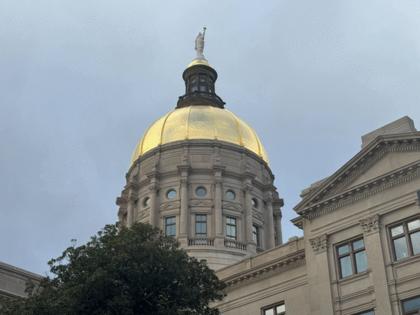New Georgia laws affect transgender rights, IVF and underage access to porn
Published in News & Features
ATLANTA — Hundreds of new Georgia laws take effect this week after being adopted by the state’s Republican-led Legislature.
Some — like a law restricting transgender students from playing on school sports teams that don’t match the gender they are assigned at birth — mirror President Donald Trump’s agenda.
Others are aimed at community needs, like one protecting in vitro fertilization and another prompted by last year’s deadly school shooting at Apalachee High School.
IVF
State Rep. Lehman Franklin, a Republican from Statesboro, sponsored the IVF bill after the Alabama Supreme Court ruled last year that embryos are “extrauterine children,” so destroying them would be considered the “wrongful death of a minor.”
Franklin’s wife gave birth to a baby this summer using IVF.
“I would bet that there is no one here in this room that has not been either directly or indirectly affected by IVF,” he said during remarks on the House floor. “Everyone that I’ve been in contact with has had their own personal experience.”
This law does not change Georgia’s 2019 abortion statute; it doesn’t grant new rights or take any away. But Franklin and nearly every member of the General Assembly wanted to ensure that access to the reproductive treatment remains available in the state.
In Georgia, “personhood” is only granted when fetal cardiac activity is detected in an embryo that’s inside a mother’s womb. That happens at about six weeks, before many women know they are pregnant.
Transgender athletes
Another new law will likely see little day-to-day change on courts, fields, rinks and in pools, but Georgia Republicans say it is necessary to ensure fairness in school sports.
Under new provisions statewide, transgender student-athletes are restricted from playing on school sports teams that match their gender identity. Instead, they must play on teams according to their gender assigned at birth.
The law also requires transgender students to use locker rooms and restrooms according to the sex on their original birth certificate.
State Sen. Greg Dolezal, a Republican from Cumming who sponsored the legislation, said the law “restores fairness and preserves the integrity of women’s athletics.”
There are no known transgender student-athletes playing in Georgia schools. LGBTQ+ rights advocates have said the legislation was a solution looking for a problem that didn’t exist.
Bentley Hudgins, the Georgia director for the Human Rights Campaign, previously said Republicans’ “attacks on kids and trans women are tired and don’t help anyone.”
The China ‘threat’
State lawmakers don’t have much say in foreign policy, but Georgia legislators took aim at China with several measures aimed at what they said was a looming security threat.
Republican legislators filed several bills concerning foreign adversaries, including China, that Gov. Brian Kemp signed into law.
One new law prohibits state agencies from purchasing goods from certain foreign countries that pose a security threat, as defined by the Georgia Technology Authority.
Another law requires universities in Georgia to produce semiannual reports about funding they receive from foreign countries of concern, as defined by the U.S. Secretary of Commerce.
A third measure prevents certain foreigners from acquiring land, specifically near U.S. military facilities.
“Anything that makes us be mindful and careful in our relationship with China is important because China is an economic competitor to us,” said state Rep. Long Tran, chair of the Asian American and Pacific Islander caucus.
But Tran, D-Dunwoody, said a few of the new laws go overboard and are vague. His aim during the legislative session was to make sure the efforts were addressing the Chinese government rather than someone of Chinese origin who moved to the U.S. to start a new life.
“Some of those bills are riding on fear, exploiting the fears of Georgia voters to make them, to make the representative look like they’re keeping Georgia safe,” he said.
Schools
After the deadly shooting at Apalachee High School last September, lawmakers sought to examine schools to ensure students were learning under the most supportive conditions.
In addition to a sprawling bill to implement new school safety requirements that took effect in April, legislators aimed to tackle the factors that are keeping kids from showing up.
During the 2022-2023 school year, about 20-30% of students in most metro Atlanta districts were chronically absent, meaning they missed at least 10% of the school year. A new law prevents students from being expelled because of absenteeism and installs new procedures to address school attendance.
The Legislature also took steps to support kids’ mental health. A new law creates an interstate compact for school psychologists to address a shortage in the system. Those who are qualified could obtain an equivalent license to practice in any of the member states.
Another measure would ban students from using cellphones during the school day takes effect statewide next July, but some districts already have such a policy in place.
Privacy
Another new law protects personally identifiable information of judges and their spouses. Although there is some debate about transparency, especially to ensure candidates live where they say they do for residency requirements, the Legislature agreed that judges, who are supposed to operate apart from partisan politics, should have certain privacies in order to perform their duties.
The new law comes amid increasing political violence, including the attack on former U.S. House Speaker Nancy Pelosi’s husband, the attempted assassination of Trump on the campaign trail last year, and the assassination of a Minnesota lawmaker and her husband and shootings of another Minnesota lawmaker and his wife.
Not all new laws are deeply intense.
Starting Tuesday, cornbread will be the official state bread. Brunswick stew will be the official Georgia stew. And the fourth Friday in November will be National Sugar Cane Syrup Day.
_____
©2025 The Atlanta Journal-Constitution. Visit at ajc.com. Distributed by Tribune Content Agency, LLC.







Comments